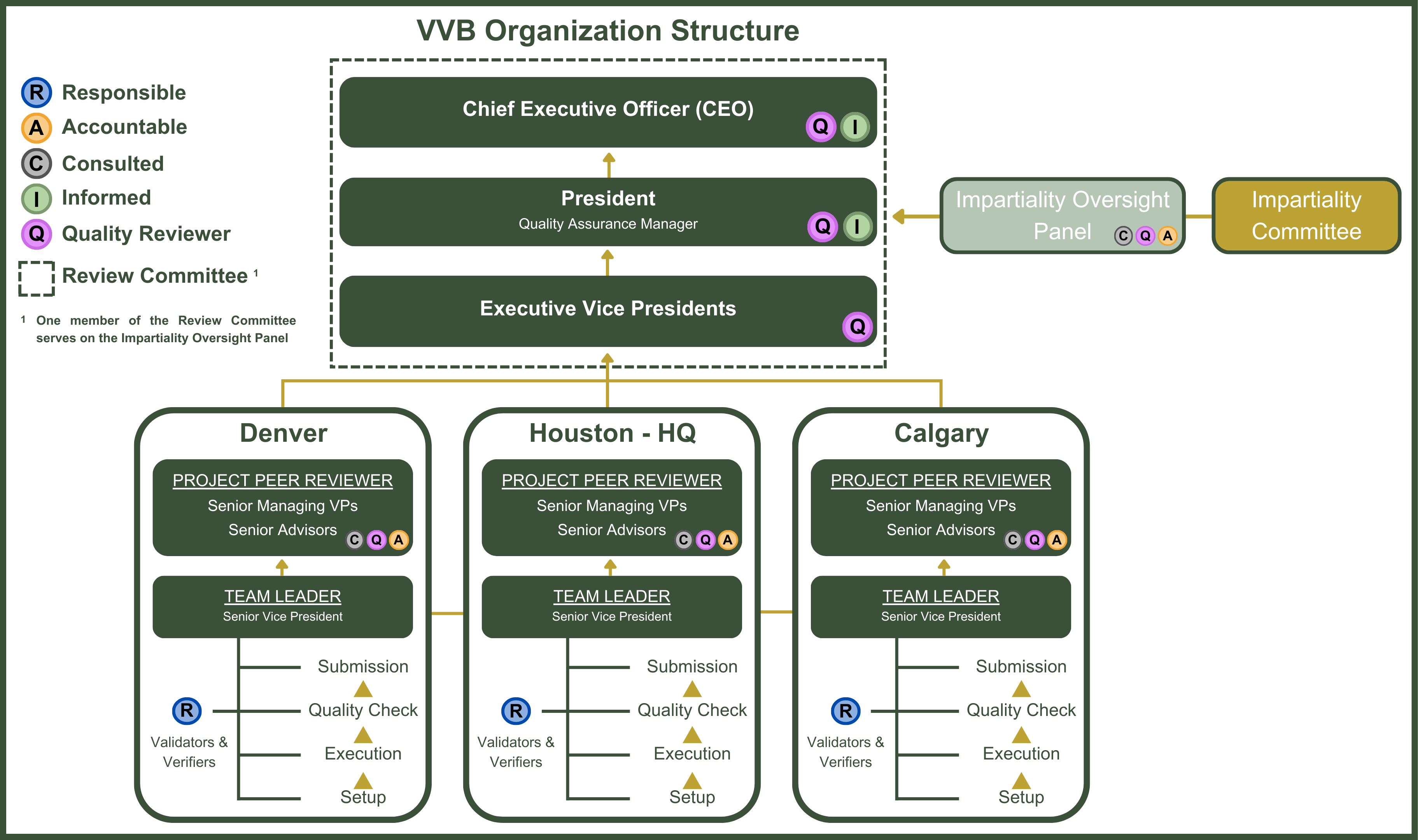GHG Validation and Verification
IMPARTIALITY STATEMENT FOR EMISSION VERIFICATION AND VALIDATION ACTIVITIES
Ryder Scott is committed to providing reliable validations and verifications of GHGs. This commitment is assured through our Quality Delivery Organization with 3 Lines of Defense (3LoD) and the Project Delivery and Internal Project Review Process as described in the QEAMS Sections 2.2 and 2.3, respectively. Per ISO 9001:2015 and ISO 14001:2015, the Plan-Do-Check-Act cycle (PDCA) allows Ryder Scott to resource and manage projects adequately and to identify and act on opportunities for improvement.
In its role as a verification and validation body, Ryder Scott understands the importance of impartiality and independence and is committed to assessing Greenhouse Gas inventories and statements following the compliance requirements of ISO 14065:2020, ISO/IEC 17029:2019 and applicable GHG Programme.
Ryder Scott is responsible for the impartiality of its verification/validation activities and will not allow commercial, financial or other pressures to compromise impartiality. Ryder Scott monitors its activities and its relationships to identify threats to its impartiality. This monitoring includes the relationships of its management, directors, employees and validators and verifiers. If a threat to impartiality is identified, its effect is eliminated or minimized so that impartiality is not compromised. Threats to impartiality can include, but are not limited to the following:
- Self-interest
- Self-review
- Familiarity (or trust)
- Intimidation
The validation and verification projects are conducted impartially and independently, and the conclusions are reported based on the evidence. Under no circumstance will Ryder Scott accept a project to provide related consultancy and validation/verification for the same claim from the same client. These validation and verification services will not be marketed or offered as linked with activities of any organization that provides consultancy for the same projects under evaluation.
The quality and reliability of validations and verifications are of the utmost importance. Ryder Scott will evaluate the project’s complexity and budget following the engagement requirements described below.
In accordance with ISO 17029:2019 Section 5.3.12, Ryder Scott will take action to respond to any inappropriate links or announcements by any consultancy organizations stating or implying that the validation/verification process is simpler, easier, faster, or less expensive. Ryder Scott will take action to respond to any threats to its impartiality arising from the actions of other persons, bodies, or organizations.
Ryder Scott’s Greenhouse Gas Verification and Validation Manual (GHGVV) outlines a consistent, impartial, and transparent validation and verification process. The manual also guides reviewing various methodologies to ensure they comply with the approval process. The Head of Sustainability is responsible for maintaining the GHGVV manual relevant and up to date with the internal and external requirements of the GHG validation and verification bodies.
GHG validation and verification team leaders responsible for the validation and verification activities shall be officers of the company at a senior vice president position or above. The decisions regarding the GHG validation and verification works will follow our quality organization structure and 3-lines of defense. Project managers (Senior VPs) will discuss the decisions with their Group Supervisors (Managing Senior VPs). Finally, the overall project will be independently reviewed by a member of the Review Committee. The Group Supervisors may delegate certain validation and verification activities to committees or individuals. Regardless of this delegation, the ultimate project approval will still be subjected to independent review by a member of the Review Committee. The responsibilities and controls prescribed in this paragraph apply to all our branches located in Houston, Denver, and Calgary.
COMPLAINTS AND APPEALS PROCESS
Complaints
The complaints process is intended to manage, evaluate, take necessary corrective action, and make decisions on Complaints in a confidential manner per ISO 17029 Section 9.10. The complaints process is as follows:
Clients or Complainants will submit the complaint to the Project Manager responsible for the disputed assessment services along with the following information:
- The name of the client/complainant and pertinent contact information
- The details/nature of the complaint
- A suggested resolution to the complaint, if applicable
The Head Advisor, who is independent of any technical project work, will:
- Review the complaint to determine whether it pertains to validation/verification activities for which Ryder Scott is responsible.
- Inform the Client or Complainant of:
- Receipt of the complaint
- The proposed process for handling the complaint, including the possible appointment of a complaint review team
- The Ryder Scott staff assigned to resolve the complaint (if different from the Head Advisor)
- A summary of the next steps and timelines
- The formal notice of the outcome of the complaint investigation
Ryder Scott will communicate the results to the Client or Complainant upon the conclusion of the complaint review process. These investigations and decisions on complaints shall not result in any discriminatory actions. All appeals will be stored and tracked within the GHG SharePoint file system in a folder only accessible by the SCV Corporate Representative and Quality System Manager to maintain confidentiality.
If the Client or Complainant is dissatisfied with the outcome of the complaint investigation and decision, they will be directed to the appeals process.
Appeals
The Appeals process is intended to manage, evaluate, take necessary corrective action, and make decisions on appeals in a confidential manner per ISO 17029 Section 9.9. The appeals process is as follows:
Clients or Appellants that are dissatisfied with the resolution of the Complaints Process as outlined in Section 10 above will submit an appeal to Ryder Scott’s Head Advisor along with this information:
- The name of the client and pertinent contact
information - The details/nature of the appeal
- A suggested resolution to the appeal, if applicable
The Head Advisor, who is independent of any technical project work, will:
- Review the appeal to determine if the appeal pertains to the validation/verification activities for which Ryder Scott is responsible.
- Inform the Client or Appellant of:
- Receipt of the appeal
- The proposed process for handling the appeal, including the possible appointment of an Appeal Review Team
- The Ryder Scott staff assigned to resolve the appeal (if different from the Head Advisor)
- A summary of the next steps and timelines
- The formal notice of outcome of the appeal investigation.
Ryder Scott will communicate the results to the Client or Appellant upon the conclusion of the appeals review process. These investigations and decisions on appeals shall not result in any discriminatory actions. All appeals will be stored and tracked within the GHG SharePoint file system, in a folder only accessible by the SCV Corporate Representative and Quality System Manager to maintain confidentiality.
If the Client or Appellant is dissatisfied with the outcome of the appeal investigation and decision, they will be directed to voice their concerns with ANAB as Ryder Scott’s accreditation body.
Ryder Scott adheres to ISO 14065:2020 Annex B (informative). We are dedicated to ensuring that environmental information validated or verified by our organization is utilized responsibly and transparently. Ryder Scott is committed to upholding the highest standards of integrity and transparency in the validation and verification of environmental information. Ryder Scott’s opinions made publicly available by clients shall be provided in its entirety and we have established clear rules governing the referencing of validated or verified data in environmental information statements. These measures are integral to maintaining the credibility and trustworthiness of our accreditation symbols and claims.
Rules for referencing to v/v statements:
- Validation / Verification: Clients should state whether the statement was validated or verified by RSC.
- Clear Reference: Identify RSC name and include the accreditation details (accreditation body, the scope of accreditation, etc.)
- Reference V/V report: Cite the V/V report indicating the title, date, and concise description of its scope. Acceptable references are: “In its opinion dated 20xx-xx-xx Ryder Scott concluded with reasonable assurance that the data and information in our statements were fairly stated ” or ” In its opinion dated 20xx-xx-xx, Ryder Scott found no evidence to indicate that the data and information in our statement were not fairly stated” or “In its opinion dates 20xx-xx-xx Ryder Scott stated that it had not found any evidence to indicate that the assumptions, methods and limitations that we cited in our statement did not provide a reasonable basis for our projections and forecasts.”
- Accurate Representation and Transparency: Clients should accurately represent the content of the v/v statement w/o making misleading claims.
- Approval: Public communications based on v/v information should be approved by RSC to ensure proper representation.

Download here
